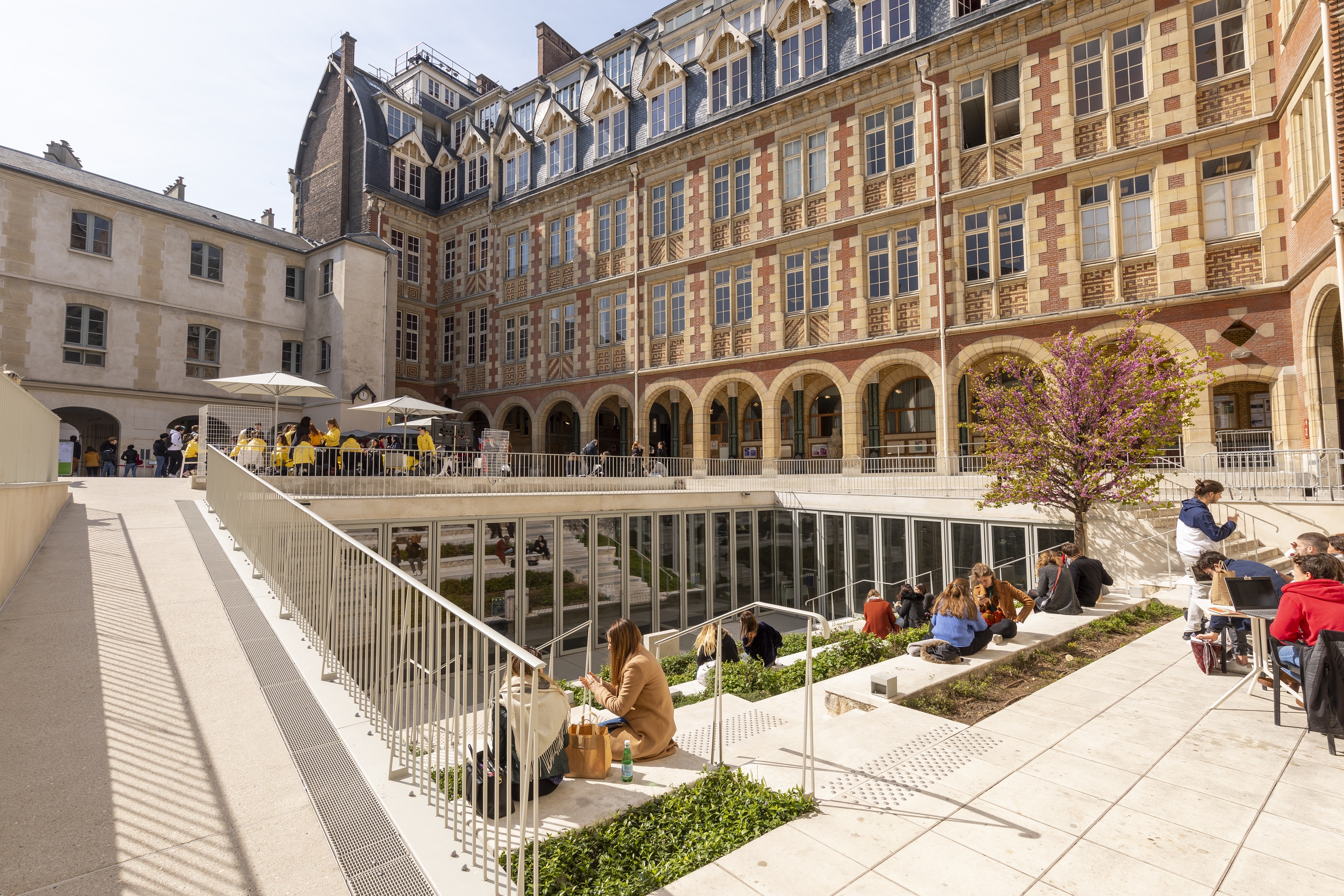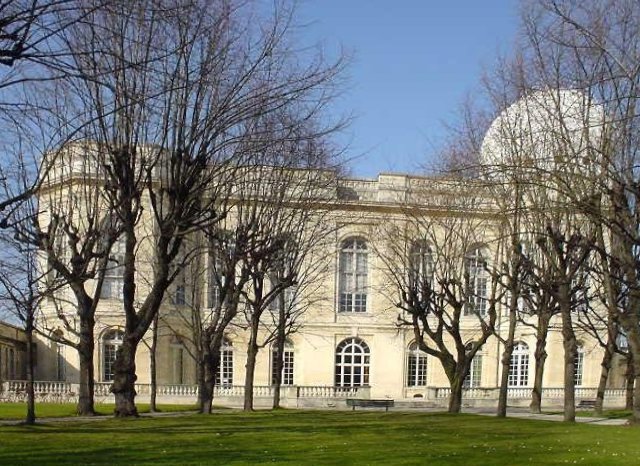|
Couperin (consortium)
COUPERIN (Consortium unifié des établissements universitaires et de recherche pour l'accès aux publications numériques) (English: Unified Consortium of Higher Education and Research Organizations for Access to Digital Publications) is an academic consortium in France. Formed in 1999, it includes more than 250 universities, research organizations, Grandes écoles (schools), COMUE, and others. The consortium negotiates with publishers the prices and conditions of access to scientific publications and other digital resources for the benefit of its members. It promotes open science, particularly with regard to scientific publications, both nationally and internationally. It is headquartered in Paris. Members As of 2018, members of the Couperin consortium include the following institutions. Universities * Polytechnic Institute of Bordeaux, Bordeaux INP * Institut national universitaire Champollion * * COMUE - Université confédérale Léonard de Vinci * COMUE - Lille Nord de Fr ... [...More Info...] [...Related Items...] OR: [Wikipedia] [Google] [Baidu] |
Consortium
A consortium (plural: consortia) is an association of two or more individuals, companies, organizations or governments (or any combination of these entities) with the objective of participating in a common activity or pooling their resources for achieving a common goal. is a Latin word meaning "partnership", "association" or "society", and derives from ("shared in property"), itself from ("together") and ("fate"). Examples Educational The Big Ten Academic Alliance in the Midwest and Mid-Atlantic U.S., Claremont Colleges consortium in Southern California, Five College Consortium in Massachusetts, and Consórcio Nacional Honda are among the oldest and most successful higher education consortia in the World. The Big Ten Academic Alliance, formerly known as the Committee on Institutional Cooperation, includes the members of the Big Ten athletic conference. The participants in Five Colleges, Inc. are: Amherst College, Hampshire College, Mount Holyoke College, Smith College, a ... [...More Info...] [...Related Items...] OR: [Wikipedia] [Google] [Baidu] |
Institut Catholique De Paris
The Institut Catholique de Paris (ICP), known in English as the Catholic University of Paris (and in Latin as ''Universitas catholica Parisiensis''), is a private university located in Paris, France. History: 1875–present The Institut Catholique de Paris was founded in 1875, under the name of the Université Catholique de Paris by Maurice Le Sage d'Hauteroche d'Hulst. The school settled on the site of the former convent of the Carmelites, however the premises were not well adapted. Gabriel Ruprich-Robert developed a new project for the site; however, due to a lack of sufficient funds, he decided to renovate some of the old buildings instead of destroying them. The first phase of the renovation took place between 1894 and 1897. Following the French law establishing the separation of the church and state, ownership of the premises was given to the state. In 1927, the premises were repurchased by the institute, allowing the second phase of the renovation to take place between 19 ... [...More Info...] [...Related Items...] OR: [Wikipedia] [Google] [Baidu] |
Université Grenoble Alpes
The Université Grenoble Alpes (UGA, French: meaning "''Grenoble Alps University''") is a public research university in Grenoble, France. Founded in 1339, it is the third largest university in France with about 60,000 students and over 3,000 researchers. Established as the University of Grenoble by Humbert II of Viennois, it split in 1970 following the wide-spread civil unrest of May 1968. Three of the University of Grenoble's successors—Joseph Fourier University, Pierre Mendès-France University, and Stendhal University—merged in 2016 to restore the original institution under the name Université Grenoble Alpes. In 2020, the Grenoble Institute of Technology, the Grenoble Institute of Political Studies, and the Grenoble School of Architecture also merged with the original university. The university is organized around two closely located urban campuses: Domaine Universitaire, which straddles Saint-Martin-d'Hères and Gières, and Campus GIANT in Grenoble. UGA also owns and ope ... [...More Info...] [...Related Items...] OR: [Wikipedia] [Google] [Baidu] |
Pôle Universitaire Léonard-de-Vinci
Leonardo de Vinci University Center (French: ''Pôle universitaire Léonard de Vinci''), is a French private university cluster located at La Défense. History The Leonardo de Vinci University Center, a higher education University center, has been created in 1995 by the Hauts-de-Seine general council, managed by Charles Pasqua: it is thus often colloquially nicknamed the “Pasqua University" (''Fac Pasqua''). The cluster was a private French higher education. Originally, it was financed mainly by public funds. The cluster is now managed by the Leonardo da Vinci Association (ALDV) and no longer receives any subsidy from the Hauts-de-Seine. The cluster has been managed by Pascal Brouaye since 2012. The Leonardo de Vinci University Center has been EESPIG certified since January 10, 2018. Organisation and administration The Leonardo de Vinci University Center is a building belonging to the Hauts-de-Seine department inside which there are several occupants who have signed an ... [...More Info...] [...Related Items...] OR: [Wikipedia] [Google] [Baidu] |
Observatoire De Paris-Meudon
The Paris Observatory (french: Observatoire de Paris ), a research institution of the Paris Sciences et Lettres University, is the foremost astronomical observatory of France, and one of the largest astronomical centers in the world. Its historic building is on the Left Bank of the Seine in central Paris, but most of the staff work on a satellite campus in Meudon, a suburb southwest of Paris. The Paris Observatory was founded in 1667. Construction was completed by the early 1670s and coincided with a major push for increased science, and the founding of the Royal Academy of Sciences. King Louis XIV's minister of finance organized a "scientific powerhouse" to increase understanding of astronomy, maritime navigation, and science in general. Through the centuries the Paris Observatory has continued in support of astronomical activities, and in the 21st century connects multiple sites and organizations, supporting astronomy and science, past and present. Constitution Administrat ... [...More Info...] [...Related Items...] OR: [Wikipedia] [Google] [Baidu] |
Muséum National D'Histoire Naturelle
The French National Museum of Natural History, known in French as the ' (abbreviation MNHN), is the national natural history museum of France and a ' of higher education part of Sorbonne Universities. The main museum, with four galleries, is located in Paris, France, within the Jardin des Plantes on the left bank of the River Seine. It was formally founded in 1793 during the French Revolution, but was begun even earlier in 1635 as the royal garden of medicinal plants. The museum now has 14 sites throughout France. History 17th–18th century File:Jardin du roi 1636.png, The Royal Garden of Medicinal Plants in 1636 File:Buffon statue dsc00979.jpg, Statue of Georges-Louis Leclerc, Comte de Buffon in the formal garden File:Buffon, Georges Louis - Leclerc, comte de – Histoire naturelle, générale et particuliére, 1763 – BEIC 8822844.jpg, Buffon's "Natural History" (1763) File:MNHN-logo.jpg, The museum's seal, designed in 1793, illustrates the three realms of Nature, Collecti ... [...More Info...] [...Related Items...] OR: [Wikipedia] [Google] [Baidu] |
Institut Supérieur De Mécanique De Paris (SupMeca)
An institute is an organisational body created for a certain purpose. They are often research organisations (research institutes) created to do research on specific topics, or can also be a professional body. In some countries, institutes can be part of a university or other institutions of higher education, either as a group of departments or an autonomous educational institution without a traditional university status such as a "university institute" (see Institute of Technology). In some countries, such as South Korea and India, private schools are sometimes referred to as institutes, and in Spain, secondary schools are referred to as institutes. Historically, in some countries institutes were educational units imparting vocational training and often incorporating libraries, also known as mechanics' institutes. The word "institute" comes from a Latin word ''institutum'' meaning "facility" or "habit"; from ''instituere'' meaning "build", "create", "raise" or "educate". ... [...More Info...] [...Related Items...] OR: [Wikipedia] [Google] [Baidu] |
Institut National Supérieur De Formation Et De Recherche Pour L'éducation Des Jeunes Handicapés Et Les Enseignements Adaptés
The Institut national supérieur de formation et de recherche pour l'éducation des jeunes handicapés et les enseignements adaptés or INS-HEA (''National Higher Institute for Training and Research for the Education of Young Disabled Persons and Special Education'') is a public college in Suresnes. It is part of the Université Paris Lumières. INSHEA has its buildings next to the Fort Mont-Valérien, in Suresnes. About eighty Academics train National Education staff in the fields of disability Disability is the experience of any condition that makes it more difficult for a person to do certain activities or have equitable access within a given society. Disabilities may be Cognitive disability, cognitive, Developmental disability, dev ... and difficulty of schooling. References External links Official website Educational institutions established in 1954 1954 establishments in France Education in Île-de-France Suresnes {{France-school-stub ... [...More Info...] [...Related Items...] OR: [Wikipedia] [Google] [Baidu] |
Institut National Polytechnique De Toulouse
Toulouse Institute of Technology (also called National Polytechnic Institute of Toulouse or INPT) is a French university cluster based in Toulouse, France, part of University of Toulouse. It was founded in 1969. The institute is composed of seven schools (six engineering schools and one school of veterinary medicine) and 17 research laboratories. The institute delivers master's degrees and Ph.D. It is a member of Institut au service du spatial, de ses applications et technologies. Composition The seven schools of the institute are: Engineering schools *École Nationale Supérieure d'Électronique, d'Électrotechnique, d'Informatique, d'Hydraulique et des Télécommunications (ENSEEIHT) *École nationale supérieure des ingénieurs en arts chimiques et technologiques (ENSIACET) *École Nationale Supérieure Agronomique de Toulouse (ENSAT) *École nationale d'ingénieurs de Tarbes (ENIT) *École d'ingénieurs de Purpan (EIP) *École Nationale de la Météorologie (ENM) School of ve ... [...More Info...] [...Related Items...] OR: [Wikipedia] [Google] [Baidu] |
Institut D'Etudes Politiques De Paris (Sciences Po Paris)
, motto_lang = fr , mottoeng = Roots of the Future , type = Public research university''Grande école'' , established = , founder = Émile Boutmy , accreditation = , affiliations = CIVICA Sorbonne Paris Cité APSIACOUPERIN CGE , academic_affiliation = , endowment = €127.2 million (2018) , budget = €197 million (2018) , chairperson = Laurence Bertrand Dorléac ( FNSP) , president = Mathias Vicherat , provost = Sergei Guriev , academic_staff = 270 , total_staff = , students = 14,000 , undergrad = 4,000 , postgrad = 10,000 , doctoral = 350 , other_students = , address = , city = Paris, Nancy, Dijon, Poitiers, Menton, Le Havre and Reims , country = France , postalco ... [...More Info...] [...Related Items...] OR: [Wikipedia] [Google] [Baidu] |
Institut D'Etudes Politiques De Lyon (Sciences Po Lyon)
An institute is an organisational body created for a certain purpose. They are often research organisations (research institutes) created to do research on specific topics, or can also be a professional body. In some countries, institutes can be part of a university or other institutions of higher education, either as a group of departments or an autonomous educational institution without a traditional university status such as a "university institute" (see Institute of Technology). In some countries, such as South Korea and India, private schools are sometimes referred to as institutes, and in Spain, secondary schools are referred to as institutes. Historically, in some countries institutes were educational units imparting vocational training and often incorporating libraries, also known as mechanics' institutes. The word "institute" comes from a Latin word ''institutum'' meaning "facility" or "habit"; from ''instituere'' meaning "build", "create", "raise" or "educate". ... [...More Info...] [...Related Items...] OR: [Wikipedia] [Google] [Baidu] |






